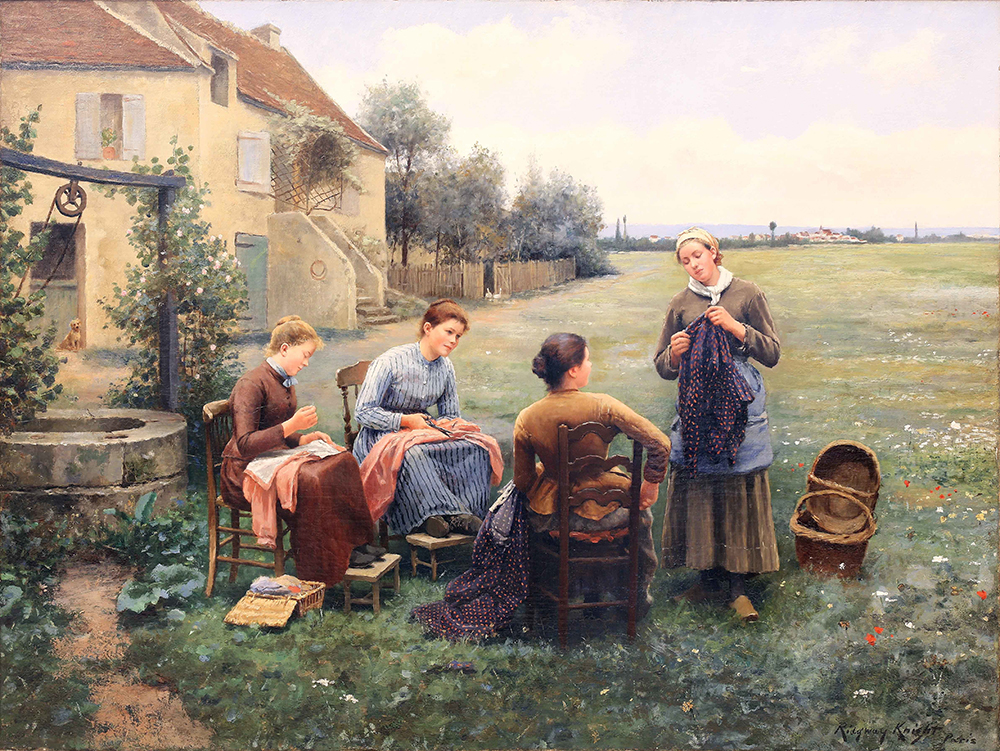Pretending to be nice?
“If you can’t say anything nice then don’t say anything at all,” says Thumper rabbit in the movie, Bambi. Sounds nice enough, right? Well, not really. Unfortunately, we as a church and as a society tend to promote this philosophy as the Christian (and now secularist) ideal. “Be kind, always” has become a mantra. However, taken either literally or to extremes, this rule (along with its entire philosophy) can (and is) seeding and sowing another form of divisiveness. Some have even labeled the mandates stemming from this philosophy as “oppressive.” (I know. Thumper? A divisive oppressor?) Stay with me, dear readers, and hear me out.

Rather than speaking truthfully and even ethically to each other, various researchers have found that historically, many women in Western culture have tended to suppress their own truths and realities in the name of inauthentic “niceness.” Western research from the last few decades claims that as a whole, women (as well as some other marginalized peoples or groups), having no socially constructive outlet were/are more likely to use subversive dialogue and behavior in order to meet their individual and collective needs. Additionally, American studies conducted in the twentieth and twenty-first centuries had concluded that a biological element coupled with traditional cultural expectations made women and other marginalized groups more susceptible to inauthentic niceness. In trying to remedy these societal ills, and rightly or wrongly in present-day Western culture, men—particularly White men and women—are often accused of inauthentic interpersonal communication. Thus, many have become more self-censoring and so tend to be more inauthentic in their communication. For instance, we need look no further than increasingly cautious (and even dangerous) communication climates involving social discourse in the public square, social media, the workplace, and even in private interactions. We have all witnessed (and perhaps are a part of) the harsh judgment against those who fail to properly comply to the ever-changing and increasingly divisive North American cultural and ideological expectations; every year seems to bring more written and unwritten rules involving “acceptable” social discourse and behavior. “Cancel culture” is swift in its punishment (and even annihilation) against non-compliers. Consequently, society is experiencing a growing suppression of speech and expression due to the desire to be polite and also due to fear of being socially shamed or “cancelled.” This social and political ideology and its mandates have proven to be formidable and forceful in terms of expected compliance; nonconformity and words that might be interpreted by various activists, groups, politicians, and/or individuals as being insensitive or even “violent,” the perpetrators are swiftly shamed and/or punished.
Rightly, Western culture has set (and continues to set) public-policy measures in efforts to remedy past and present injustices. Throughout the decades, however, there have arisen various degrees of irony and unintended consequences that often accompany public-policy making. For instance, some of these cultural expectations and mandates were rooted and implemented for benign and just purposes in order to foster societal kindness, inclusivity, and equality. Unfortunately, some folks have adopted extreme views and thus desire and/or call for unkind shaming or punishments against those who fail to live up to their interpretations or definitions of “good” or “moral” behavior. Those who (intentionally or unintentionally) fail to comply are often cruelly punished and shamed with character attacks, group expulsion, job loss, etc.
As a university instructor, I am aware (and have witnessed) this increasingly fundamentalistic approach within Western colleges and universities. Consequently, there are a rising number of educators and students who believe that individual and group self-censoring fosters an inauthentic polite or “nice” communication climate by stoking an unnecessary and unhealthy fear. Furthermore, critics argue that highly monitored and tightly controlled and/or compelled speech are fostering unhealthy communication climates that further inflame resentments between individuals and groups. The resulting division is the antithesis of promoting genuine love and compassion. Still, others believe that these divisions and contentions are necessary sacrifices for society’s “greater good”; in other words, this ideological movement against all “isms” while dismantling American institutions (such as capitalism) is a form of social and cultural reckoning for historically marginalized groups to achieve an equitable and egalitarian society.
In any case, inauthentic “niceness” can also influence our Latter-day Saint community. Our fearful inability to speak candidly about our personal truths (about ourselves and each other) can undermine our sincerity and ability to love. To nourish and foster a more healthy community and communication climate, we can first recognize our individual need and ability to adopt good-faith and grace filled personal interactions by using healthy and productive communicative skills. Then, we practice … and practice some more. Honing any new skill means failing a few times (perhaps many times) before we get it right. Failing is part of the learning process, and so we have many opportunities to extend grace and mercy to each other.

In this particular post, I also include the historically unhealthy and negative unwritten “rules” or codes of conduct and speech and behavior that have been traditionally (and often still are) acceptable social interactions within groups. These unwritten rules and expectations can be applicable within our LDS social groups, and when we work together in our Church service. As stated previously, I have taught interpersonal communication for many years at my local university. Consequently, I’m very familiar with the communication strategies people often use—particularly among women. (Although, I do realize that social norms and expectations are constantly changing. And, I realize my observations and candor in this post might be offensive to some people.) Regardless, I seek to build stronger ties to each other; not to foster contention or guilt. I also include my fragile, faulty self in this post. Moreover, if we truly want to rid ourselves of unethical speech and behavior, the first step is to admit and be accountable for our individual culpability. Surely, many of us spend enormous amounts of negative energy upholding and acting upon our unhealthy mindsets. Listed below (coming from an American perspective) are some of these thought, speech, and behavioral patterns that have historically and are presently troublesome to women as individuals and in groups. These claims come from the research of feminist author and activist, Phyllis Chesler in her book, Woman’s Inhumanity to Woman. (Even though her book’s latest edition was published in 2009, it’s still considered a classic):
- We should not show outward anger toward each other (it wouldn’t be nice).
- We should avoid direct confrontation (it isn’t nice).
- To diffuse our anger, we tend to gossip, shun, avoid, or use other forms of indirect aggression. Any form of direct assertiveness is considered impolite.
- We should be outwardly “kind” (meaning feigned kindness) regardless of how angry we feel or how badly another woman (or group of women) mistreats us.
- If confronted with our bad behavior, we should deny it or pretend ignorance. Or, we might resort to insincere apologies.
- If there’s no way to deny our bad behavior, then we might claim: “I’m just trying to be helpful.”
- To directly assert our wants and needs to another woman or individual is impolite. Therefore, we should learn to read each other’s minds in order to anticipate each other’s needs. If we fail to accurately read minds, we can expect criticism.
- We should pretend that we are incapable of being mean to another woman or an individual. Boys and men tend to engage in bullying, but not women.
- If we do admit our pettiness, meanness, or bullying toward another woman (or group of women), we should justify our bad behavior. Even better: Enlist other women to feel sorry for us and to “circle the wagons” against the woman or individual who offends us.
- If another woman or individual disagrees with us that automatically means they doesn’t like us.
- We should not show our sadness for too long of a time period. Otherwise, we may be perceived by others as ungrateful or failing “to count our blessings.”
- We should not seem too happy or too contented lest we come off as boastful or prideful.
- Groups of women or individuals should all “progress” together at the same time and at the same level. If a woman in our group “gets ahead” of us, we might feel threatened and feel the urge (often acting on it) to “cut them down to size”….our size. We might feel expected to present an illusion of “equality” at all times.
- Women should nurture and/or “mother” each other at all times. We should also be careful in attempting to set boundaries with each other, or we may be perceived by others as selfish and unwilling to serve/give.
- We should choose an inauthentic “peace” or a path of least resistance in our interactions with each other. Otherwise, we may be perceived as aggressive or contentious.
- We should think and act alike, or we will not be perceived as “unified.” Difference can often equate to dissension and feels threatening.

Federico Barocci ‘s painting of Mary and Elizabeth
After reading these unwritten “rules,” many of us might think:
- Who me? I would never be like that. (We all tend to or do engage in these behaviors at some point in our lives and in varying degrees—whether we admit it or not; we’re human. Also, it’s much easier to see these behaviors in others while denying or ignoring our own culpability.
- Even if I do some of those things, I don’t mean to hurt anybody. (Whether intended or not, the end result is still often non-productive and painful. And again, whether we admit it or not our intention is often meant to shame or hurt another woman, or group of women, or groups of individuals.)
- The author is just focusing on the negative aspects of women and/or groups and individuals. She should focus on women’s positives. (Still, wouldn’t it be better if all individuals sincerely strived to own up and be accountable for our own behavior in order to move forward and build a productive, constructive, and emotionally healthy community?)
Let’s acknowledge and embrace our weak, imperfect, fragile, vulnerable selves as individuals and as a community. It’s okay that we’re not okay all the time. The Lord doesn’t expect perfection, so why should we expect perfection from each other? These unrealistic expectations simply encourage emotional and spiritual disease. I love the Book of Mormon scripture in Ether 12:27:
And if men come unto me I will show unto them their weakness, I give unto men weakness that they may be humble; and my grace is sufficient for all men that humble themselves before me; for if they humble themselves before me, and have faith in me, then will I make weak things become strong unto them.
I love this passage because of its intimate and personal tone of our Savior. I feel like He’s putting his divine, comforting, safe arm around us. He’s fully aware of our sometimes meanness or snottiness; still, this scripture is hard evidence that He doesn’t condemn us for it. Furthermore, He expects us to be weak; He “give[s] unto men (and women) weakness.” We all have our own brand of weakness and negative proclivities. So why should we be so horrified with ourselves and with each other when we show weakness? Why should we have such difficulty talking about our differences? I think it’s because we are often so fearful. Many of us also don’t know how. And what we don’t know, we tend to fear. In my next post, I’ll discuss ideas in promoting ethical and productive communication climates and patterns within our Latter-day Saint community.
Here’s to reforming Thumper,
Julie

